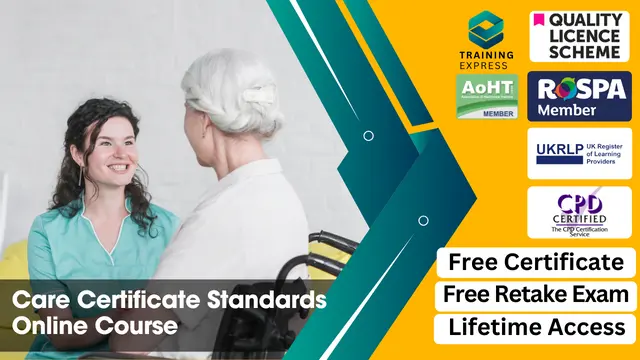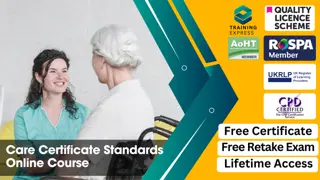
Care Certificate Standards 1-15
QLS Endorsed & CPD Certified | Free PDF & HARDCOPY Certificates + Additional Study Materials | Lifetime Access
Training Express Ltd
Summary
- CPD Accredited Hard copy Certificate - Free
- CPD Accredited PDF Certificate - Free
- QLS Endorsed Certificate - £69
- Tutor is available to students
Add to basket or enquire
Overview
Care Certificate (Standards 1 to 15) QLS Endorsed Level 2
This Care Certificate course is designed to provide those who are new to the healthcare sector with an in-depth understanding of the different types of roles and policies and standard procedures involved in providing care.
In this Care Certificate preparation course, you will broaden your understanding of the different working relationships in social care and the agreed ways of working in this sector. This Care Certificate preparation course covers fundamentals such as conflict resolution, staying up-to-date syllabus, and the roles and responsibilities of care workers.
Key Features
- The Quality Licence Endorsed
- CPD Certification Service Approved Care Certificate Preparation Course
- Instant FREE CPD Accredited E-certificate
- Fully online, interactive course
- Developed by qualified professionals
Additional Study Materials
- Course 01: Safeguarding Vulnerable Adults Training
- Course 02: Observation Skills for Carers
Achievement
CPD
Curriculum
-
Provider Intro Video 00:55
-
Standard 01: Understand Your Role 45:00
-
Standard 02: Your personal development 18:00
-
Standard 03: Duty of Care 50:00
-
Standard 04: Equality and Diversity 38:00
-
Standard 05: Work in a Person Centred Way 50:00
-
Standard 06: Communication 51:00
-
Standard 07: Privacy and dignity 38:00
-
Standard 08: Fluids and nutrition 21:00
-
Standard 09: Mental Health, Dementia and Learning Disabilities 57:00
-
Standard 10: Safeguarding Adults 57:00
-
Standard 11: Safeguarding Children 10:00
-
Standard 12: Basic life support 11:00
-
Standard 13: Health and Safety 1:15:00
-
Standard 14: Handling information 25:00
-
Standard 15: Infection control 20:00
-
Study Materials 01 : Safeguarding Vulnerable Adults Training 1:31:24
-
Study Materials 02: Observation Skills for Carers 1:13:38
Course media
Description
The Curriculum of Care Certificate (Standards 1 to 15) - CPD Certified & QLS Endorsed
In our Care Certificate preparation course, we have covered 15 care certificate standards extensively required for participating in the care certificate exam. We covered all the necessary topics from scratch so that you may find it convenient while preparing for the care certificate from home.
The brief curriculum of the care certificate preparation course is mentioned below:
- Standard 01: Understand your role
- Standard 02: Your personal development
- Standard 03: Duty of care
- Standard 04: Equality and diversity
- Standard 05: Work in a person-centred way
- Standard 06: Communication
- Standard 07: Privacy and dignity
- Standard 08: Fluids and nutrition
- Standard 09: Awareness of mental health, dementia and learning disabilities
- Standard 10: Safeguarding adults
- Standard 11: Safeguarding children
- Standard 12: Basic life support
- Standard 13: Health and safety
- Standard 14: Handling information
- Standard 15: Infection prevention and control
Endorsement
This course is endorsed by the Quality Licence Scheme QLS.
Accreditation
Our Care Certificate preparation course is CPD Quality Standards accredited, providing you with up-to-date knowledge and helping you to become more competent and effective in your chosen field.
Disclaimer: The CPD approved course is owned by E-Learning
Solutions Ltd and is distributed under license.
Certification
Once you’ve successfully completed your Care Certificate preparation course, you will immediately be sent a digital certificate.
Who is this course for?
This course is ideal for:
- Care Worker
- Health and Social Workers
- Healthcare Assistants
- Adult Support Worker
- Mental Health Care Assistant
- Palliative Care Worker
Requirements
To enrol in this care certificate preparation course, you do not need any prior knowledge or qualification in this sector.
Please be noted: This course does not qualify you to work as a professional in this specific sector. Instead, this course will assist you in understanding the fundamentals so that you can improve your knowledge.
Career path
- Child Support Worker
- Healthcare Assistant
- Social Worker
- Care Worker
- Nurses
- Social Worker
- Health care assistants
- Assistant practitioners
- Care, support workers
Questions and answers
Within How Many Hours Can I Finish My Courses
Answer:Hello Alex, The course duration is 12.1 hours. hence, you can complete the course within 13 hours.
This was helpful.hi...what if I don't complete the course in 13 hours? also can start and stop at any time but not exceeding 13 hours altogether
Answer:Hi Chi, It's a self-paced online course. You do not need to complete the course in one go. You can continue from where you left every time you log in.
This was helpful.Hi I was wondering can you use a mobile phone to complete the course
Answer:Hi Laura, Yes, you can.
This was helpful.
Certificates
CPD Accredited Hard copy Certificate
Hard copy certificate - Included
CPD Accredited PDF Certificate
Digital certificate - Included
QLS Endorsed Certificate
Hard copy certificate - £69
Reviews
Legal information
This course is advertised on reed.co.uk by the Course Provider, whose terms and conditions apply. Purchases are made directly from the Course Provider, and as such, content and materials are supplied by the Course Provider directly. Reed is acting as agent and not reseller in relation to this course. Reed's only responsibility is to facilitate your payment for the course. It is your responsibility to review and agree to the Course Provider's terms and conditions and satisfy yourself as to the suitability of the course you intend to purchase. Reed will not have any responsibility for the content of the course and/or associated materials.



